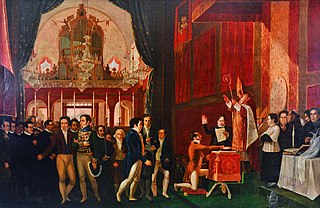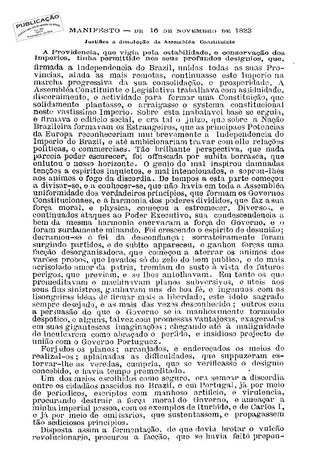
José Bonifácio de Andrada e Silva was a Brazilian statesman, naturalist, mineralist, professor and poet, born in Santos, São Paulo, then part of the Portuguese Empire.
José Mariano de Conceição Vellozo (1742–1811) was a Colonial Brazilian botanist who catalogued specimens, for example: Cedrela fissilis Vell. in Florae Fluminensis. He was born in Tiradentes, formerly called São José do Rio das Mortes, state of Minas Gerais; and died in Rio de Janeiro, state of Rio de Janeiro. While at the University of Coimbra in Portugal in the 1790s he worked with Martim Francisco Ribeiro de Andrada in translating works on mineralogy and agriculture. The standard author abbreviation Vell. is used to indicate this person as the author when citing a botanical name.

The Political Constitution of the Empire of Brazil commonly referred to as the Constitution of 1824, was Brazil's first constitution, issued on 25 March 1824 and revoked on 24 February 1891. In force during the period of the Empire of Brazil, it was issued at the emperor's request, that is, unilaterally imposed by the will of emperor Pedro I, who had ordered it from the Council of State. Pedro had dissolved the Constituent Assembly in 1823 and, through the Constitution of 1824, imposed his own political project on the country. The same Pedro later issued, in Portugal, the Constitutional Charter of 29 April 1826, inspired by the Brazilian model.

José Bonifácio de Andrada e Silva was a French-born Brazilian poet, teacher and senator. He is known as "the Younger" to distinguish him from his grand-uncle, José Bonifácio de Andrada e Silva, "the Elder" or "the Patriarch", a famous statesman who was one of the most important mentors of Brazilian independence.

Teófilo Odorico Dias de Mesquita was a Brazilian poet, journalist and lawyer, nephew of the famous Romantic author Gonçalves Dias.

The Brazilian War of Independence was an armed conflict that led to the separation of Brazil from the United Kingdom of Portugal, Brazil and the Algarves. The war was fought across various regions of Brazil, including Bahia, Maranhão, Pará, Piauí, and Cisplatina, with naval battles occurring along the Atlantic coast. Brazilian forces, consisting of regular troops, local militias, and a hastily assembled fleet, defeated the Portuguese garrisons to establish the Empire of Brazil under emperor Pedro I. The war formally ended with the Treaty of Rio de Janeiro in 1825, in which Portugal recognized Brazil's independence.
The Mineiro Republican Party was a Brazilian political party founded on 4 June 1888 and active until its extinction on 2 December 1937 by Decree No. 37 – issued by Getúlio Vargas during the Estado Novo – which abolished all political parties in Brazil. It was one of Brazil's two most powerful parties during the First Brazilian Republic along with the Paulista Republican Party.

Martim Francisco Ribeiro de Andrada was a Brazilian politician who played a leading role in the declaration of Brazil's independence and in the government the following years. He was twice Minister of Finance.

Joaquim Gonçalves Ledo was a Brazilian journalist and politician. He was active in the freemasonry movement in Brazil. He was one of the leaders of the more liberal and democrat faction during the confused period around the time of the declaration of independence of Brazil in 1822.

Events in the year 1891 in Brazil.

Events in the year 1950 in Brazil.

Events in the year 1844 in Brazil.

Bernardo Pereira de Vasconcelos was a Brazilian politician, journalist, judge and law expert of the Imperial era.

The Constituent Cortes of 1820, formal title The General and Extraordinary Cortes of the Portuguese Nation, also frequently known as the Sovereign Congress or the Cortes Constituintes Vintistas, was the first modern Portuguese parliament. Created after the Liberal Revolution of 1820 to prepare a constitution for Portugal and its overseas territories, it used a different system from the traditional General Cortes for choosing representatives, and the three traditional feudal estates no longer sat separately. The Cortes sat between January 24, 1821 and November 4, 1822 at the Necessidades Palace in Lisbon. The work of the Constitutional Cortes culminated in the approval of the Portuguese Constitution of 1822.

Nicolau Pereira de Campos Vergueiro, better known as Senator Vergueiro, was a Portuguese-born Brazilian coffee farmer and politician. He was a pioneer in the implementation of free workforce in Brazil by bringing the first European immigrants to work in the Ibicaba farm, which he owned. The contract was prepared by Vergueiro himself, establishing ownership of the production and other measures, mostly of an exploitive nature. Faced with this, the immigrants working in Vergueiro's main property, the Ibicaba farm, revolted under the guidance of Thomas Davatz, a Swiss immigrant and religious leader, who instigated the immigrant workers to grow their ambition to become small or medium-sized landowners, as they imagined they would be when they had left Europe.

The regency period is how the decade from 1831 to 1840 became known in the history of the Empire of Brazil, between the abdication of Emperor Pedro I, on 7 April 1831, and the declaration of majority of Pedro II, who was legally declared of age by the Senate at the age of 14 on 23 July 1840.

Antônio Carlos Ribeiro de Andrada Machado e Silva was a Brazilian judge, appellate judge (desembargador) and politician. At the time of Brazilian Independence, he often used the pseudonym "Philagiosetero" in his newspaper articles. He adopted the parliamentary name of "Andrada Machado".

José Joaquim Carneiro de Campos, the first Viscount and Marquis of Caravelas was a Brazilian politician, lawyer, diplomat and professor.

The Brazilian Constituent Assembly of 1823 was the first constituent assembly of Brazil, installed on 3 May 1823, under the presidency of the Major Chaplain Bishop, José Caetano da Silva Coutinho. The Assembly was tasked with drafting Brazil's first constitution. However, its activities ended with its dissolution by the police forces of emperor Pedro I of Brazil in the early hours of 12 November 1823, an episode known as the Night of Agony.

The First Reign was the period of Brazilian history in which Pedro I ruled Brazil as Emperor. It began on September 7, 1822, when Brazil's independence was proclaimed, and ended on April 7, 1831, when Pedro I abdicated the Brazilian throne.

















